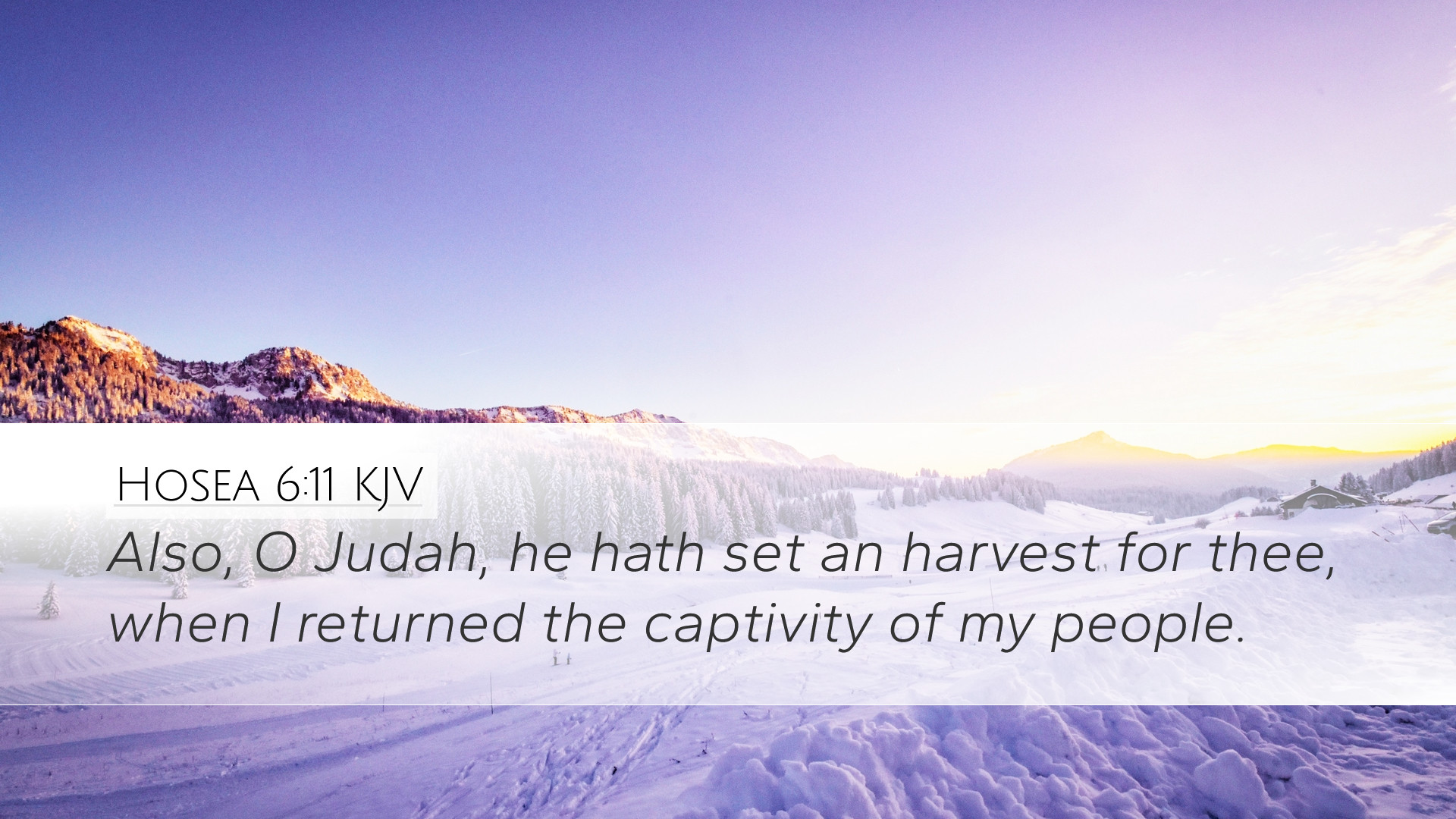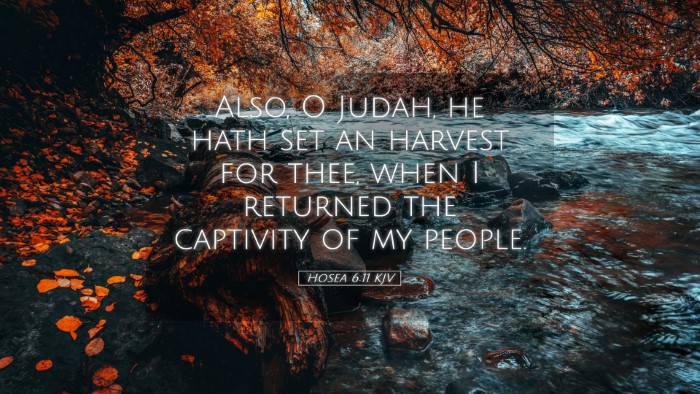Old Testament
Genesis Exodus Leviticus Numbers Deuteronomy Joshua Judges Ruth 1 Samuel 2 Samuel 1 Kings 2 Kings 1 Chronicles 2 Chronicles Ezra Nehemiah Esther Job Psalms Proverbs Ecclesiastes Song of Solomon Isaiah Jeremiah Lamentations Ezekiel Daniel Hosea Joel Amos Obadiah Jonah Micah Nahum Habakkuk Zephaniah Haggai Zechariah MalachiHosea 6:11
Hosea 6:11 KJV
Also, O Judah, he hath set an harvest for thee, when I returned the captivity of my people.
Hosea 6:11 Bible Commentary
Commentary on Hosea 6:11
Hosea 6:11 states, "Also, O Judah, there is a harvest appointed for you, when I restore the fortunes of my people." This verse marks a significant transition within the prophetic ministry of Hosea as it addresses not just Israel, but Judah as well, indicating the impending restoration and divine judgment intertwined with themes of repentance and covenant fidelity.
Contextual Overview
The Book of Hosea is set against the backdrop of Israel’s moral and spiritual decline during a time of prosperity. The Lord uses Hosea’s personal life, symbolized by his troubled marriage to Gomer, to illustrate the unfaithfulness of Israel to God, who is portrayed as a loving yet betrayed husband.
Understanding the Harvest
The term "harvest" in biblical literature often signifies a time of ingathering, blessing, or divine judgment. Here, it represents both a promise of restoration and the assurance of God’s continued faithfulness to His covenant people.
-
Matthew Henry's Commentary:
Matthew Henry emphasizes the dual implications of harvest—both judgment and peace. He notes how Judah’s impending harvest encapsulates God's grace towards His people amidst retribution, reflecting a deep sense of hope for those who align with the Lord.
-
Albert Barnes’ Commentary:
Barnes delineates this harvest as a profound turning of fortunes, reminding readers that this restoration is conditional upon Judah’s response to God’s call to repentance. He highlights the significance of Judah in the larger narrative of Israel’s redemption.
-
Adam Clarke’s Commentary:
Clarke notes the agricultural imagery used by Hosea serves to illustrate the broader theme of spiritual renewal. He elaborates on how God’s promise of restoration serves as motivation for both personal and communal repentance—the very essence of the harvest represents the blessings of obedience.
Theological Implications
The verse embodies the interplay between divine justice and mercy. Theologically, it raises profound questions concerning the character of God—His justice in punishing sin against His steadfast loyalty to redeem those who return to Him.
Repentance as a Central Theme
Throughout Hosea, the call for repentance is echoed. This particular verse implies that the harvest is not just a physical gathering but a spiritual resurrection—the restoration of the people hinges upon their acknowledgment of sin and a heartfelt return to God.
Application for Pastors and Theologians
- Pastoral Guidance: This text offers a rich source of sermon material on the themes of repentance and restoration. Pastors might encourage their congregations to engage in self-reflection regarding their faithfulness to God.
- Theological Reflection: The notion of God as both just and merciful invites scholars to explore the complexity of divine love in covenant relationships, assessing the impact of human agency on the unfolding of divine grace.
- Practical Application: Bible study groups can utilize this verse to discuss the importance of communal repentance and its role in personal and corporate transformations within the body of Christ.
Hope in Restoration
God's promise of restoration encapsulates the redemptive narrative found throughout Scripture. Despite sin, God's unwavering love provides a future filled with hope and potential for renewal. Hosea 6:11 imparts assurance that the Lord can turn desolation into joy, offering a glimpse of the eschatological hope found in Jesus Christ, who embodies the ultimate restoration of humanity’s fractured relationship with God.
Conclusion
Hosea 6:11 serves as a reminder of God's unyielding desire to restore His people, emphasizing the necessity of repentance. It invites believers into a transformative relationship where divine mercy reigns alongside justice. Engaging with the insights provided by esteemed commentaries helps pastors, students, theologians, and Bible scholars understand the profound depths of this passage, allowing it to resonate within their ministries and studies.


